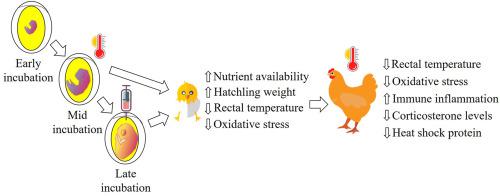Animal Nutrition ( IF 6.1 ) Pub Date : 2023-01-17 , DOI: 10.1016/j.aninu.2023.01.005 Akshat Goel 1, 2 , Chris Major Ncho 1, 3 , Vaishali Gupta 1, 3 , Yang-Ho Choi 1, 2, 3

|
Healthy chickens are necessary to meet the ever-increasing demand for poultry meat. Birds are subjected to numerous stressful conditions under commercial rearing systems, including variations in the environmental temperature. However, it is difficult to counter the effects of global warming on the livestock industry. High environmental temperature is a stressful condition that has detrimental effects on growth and production performance, resulting in decreased feed intake, retarded growth, compromised gut health, enhanced oxidative stress, and altered immune responses. Traditional approaches include nutritional modification and housing management to mitigate the harmful effects of hot environments. Currently, broiler chickens are more susceptible to heat stress (HS) than layer chickens because of their high muscle mass and metabolic rate. In this review, we explored the possibility of in ovo manipulation to combat HS in broiler chickens. Given their short lifespan from hatching to market age, embryonic life is thought to be one of the critical periods for achieving these objectives. Chicken embryos can be modulated through either temperature treatment or nourishment to improve thermal tolerance during the rearing phase. We first provided a brief overview of the harmful effects of HS on poultry. An in-depth evaluation was then presented for in ovo feeding and thermal manipulation as emerging strategies to combat the negative effects of HS. Finally, we evaluated a combination of the two methods using the available data. Taken together, these investigations suggest that embryonic manipulation has the potential to confer heat resistance in chickens.
中文翻译:

通过热操纵和卵内喂养进行胚胎调节以提高鸡的耐热性
健康的鸡是满足对禽肉不断增长的需求所必需的。在商业饲养系统下,鸟类会承受多种压力条件,包括环境温度的变化。然而,很难抵消全球变暖对畜牧业的影响。高环境温度是一种压力条件,对生长和生产性能具有不利影响,导致采食量减少、生长迟缓、肠道健康受损、氧化应激增强和免疫反应改变。传统方法包括营养改良和住房管理,以减轻炎热环境的有害影响。目前,肉鸡比蛋鸡更容易受到热应激 (HS) 的影响,因为它们的肌肉质量和代谢率较高。在这篇综述中,我们探索了通过卵内操作来对抗肉鸡 HS 的可能性。鉴于它们从孵化到上市年龄的生命周期很短,胚胎期被认为是实现这些目标的关键时期之一。可以通过温度处理或营养来调节鸡胚,以提高饲养阶段的耐热性。我们首先简要概述了 HS 对家禽的有害影响。然后对卵内喂养和热操纵作为对抗 HS 负面影响的新兴策略进行了深入评估。最后,我们使用可用数据评估了两种方法的组合。综上所述,这些研究表明胚胎操作有可能赋予鸡耐热性。我们探索了通过蛋内操作来对抗肉鸡 HS 的可能性。鉴于它们从孵化到上市年龄的生命周期很短,胚胎期被认为是实现这些目标的关键时期之一。可以通过温度处理或营养来调节鸡胚,以提高饲养阶段的耐热性。我们首先简要概述了 HS 对家禽的有害影响。然后对卵内喂养和热操纵作为对抗 HS 负面影响的新兴策略进行了深入评估。最后,我们使用可用数据评估了两种方法的组合。综上所述,这些研究表明胚胎操作有可能赋予鸡耐热性。我们探索了通过蛋内操作来对抗肉鸡 HS 的可能性。鉴于它们从孵化到上市年龄的生命周期很短,胚胎期被认为是实现这些目标的关键时期之一。可以通过温度处理或营养来调节鸡胚,以提高饲养阶段的耐热性。我们首先简要概述了 HS 对家禽的有害影响。然后对卵内喂养和热操纵作为对抗 HS 负面影响的新兴策略进行了深入评估。最后,我们使用可用数据评估了两种方法的组合。综上所述,这些研究表明胚胎操作有可能赋予鸡耐热性。











































 京公网安备 11010802027423号
京公网安备 11010802027423号